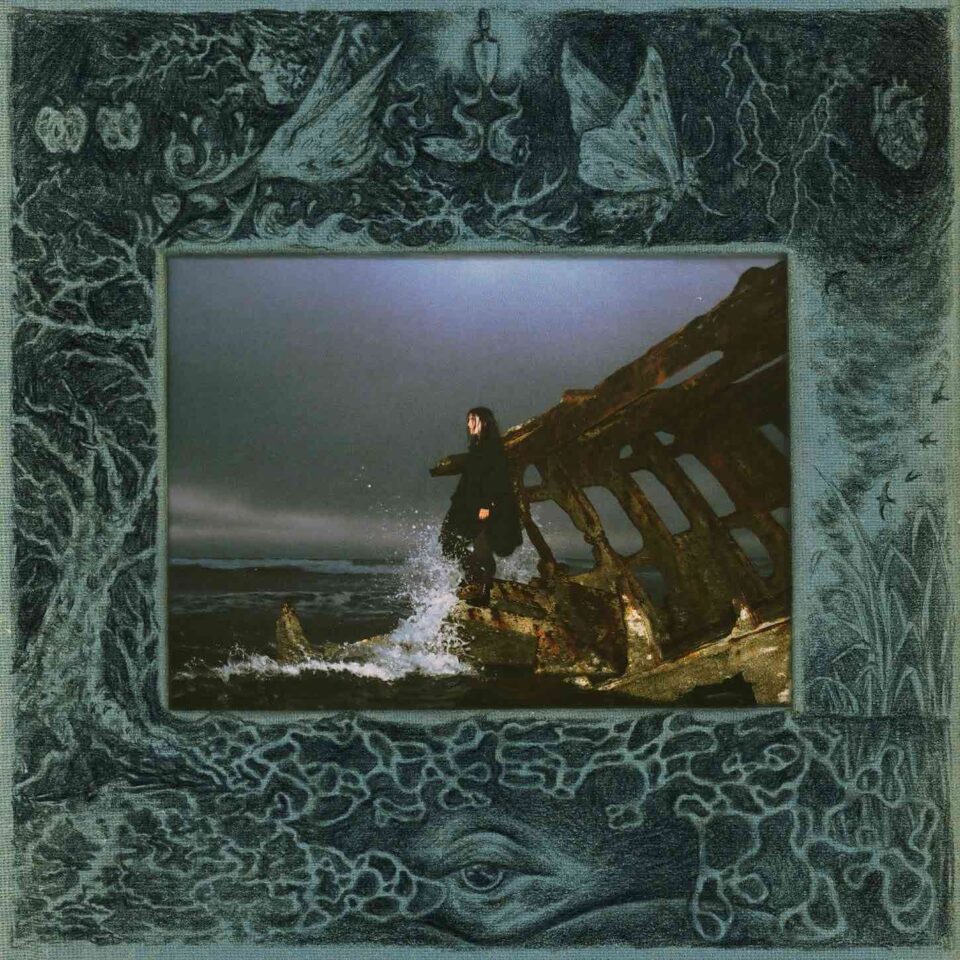Kristin Hayter is born again.
After six years of making music as Lingua Ignota—having released four albums of powerful, soul-scorching music that paired nigh-operatic darkwave with doom metal and the spiritual mystique of sacred music—she retired the project in grand fashion. She embarked on a final tour that featured suitably haunted performances, such as a couple shows at Colorado’s Stanley Hotel, the inspiration for Stephen King’s The Shining. She also organized a festival in Chicago that featured performances from artists such as Thou, Planning for Burial, and Moor Mother, where she debuted the next phase of her artistic evolution: Reverend Kristin Michael Hayter.
She committed to the bit, too: Hayter is an actual ordained minister, thanks to the convenience of internet ministry. Her spiritual reawakening from an apocalyptic figure singing of what she refers to as “divine retribution” to a charismatic, old-time (but no less eerie) folk-gospel singer is a theatrical one, for sure, but a necessary one. The transition arrives after Hayter was struck with the realization that she couldn’t keep going with her prior musical project as she had been. Emotionally exhausting in addition to simply being musically intense, Lingua Ignota became an outlet for her own trauma as a survivor of domestic abuse, and in order to continue her process of healing, she had to leave it behind. Though as a performer who often was in the presence of other bands who allowed themselves the indulgence of rocking the fuck out, she had another important realization: It just wasn’t any fun.
“[Lingua Ignota] was an outlet for pain that I didn’t know how to express,” Hayter says via her home in rural New England. “I think it was cathartic for other people to hear. But for myself, it was always just kind of the work of a very unhealed person trying to make sense of everything. So it never really felt good. So many times I’d be on tour or at a festival and I’d be watching people play, and they’d have fun and enjoy interacting with their audience. They seemed to enjoy the community aspect of it, and I’d get so envious because I never had that. It never felt good to do. And I couldn’t understand why at the time.”
“I think Lingua Ignota was cathartic for other people to hear. But for myself, it was always just kind of the work of a very unhealed person trying to make sense of everything.”
Hayter’s first release as Reverend is the appropriately titled Saved!—which is also the first record released through Perpetual Flame Ministries, the entity she created with Vile Creature’s KW Campol as a means of both releasing music and curating events. “It’s not an actual ministry,” she says with a laugh. “I’m not starting a cult. That wouldn’t be good for anyone.”
Preceded by the release of two songs—the fuzzy, Nina-Simone-meets-Black-Sabbath condemnation blues “All My Friends Are Going to Hell” and “I Will Be with You Always,” an exorcism of a dirge that takes its name from the Gospel of Matthew—Saved! is more stripped-down and lo-fi than her prior work, its songs reflective of the process of healing and the “ugly and bizarre” shape it sometimes takes. She describes the recordings she made with producer and collaborator Seth Manchester as something resembling a found object recovered in a basement from more than half a century ago.

As much as the album is a change in style for Hayter, it’s also an experiment in fidelity, manipulating analog tape through scratching it, smashing it, running it through busted tape decks, and other creative forms of destruction. This work feels vintage by virtue of the wringer that Hayter and Manchester put it through, but likewise because it carries a classic melodic sensibility that nods to early folk and bluegrass recordings. “I’ve always really liked very, very old country and bluegrass and gospel music—just the texture of those recordings has been something magical and special to me,” she says. “I probably listened to The Louvin Brothers’ Satan Is Real about a thousand times. I listen to it when I’m driving around up here. It’s just a really important record to me, and there’s something about that music that’s really dark, despite coming in a package that can be kind of upbeat.”
“I’ve always really liked very, very old country and bluegrass and gospel music—just the texture of those recordings has been something magical and special to me.”
Hayter’s slow immersion in baptismal waters began with Epistolary Grieving for Jimmy Swaggart, an EP she released as Lingua Ignota in 2021 comprising four pieces written as letters to the titular disgraced pastor. And in building on the performance-art aspect of the project, she created a “basement sanctuary,” as she recently posted on Instagram, showcasing where her imagined “shut-in for Jesus” might reside (the one potentially responsible for the lost tape of hymns that make up Saved!).
Though becoming a woman of the cloth doesn’t necessarily reflect her actual faith (Hayter was raised Catholic and thereafter abandoned it for atheism for much of her life), she finds something fascinating about the idea of having a direct line to the divine. “I really don’t know what I believe. I’m fine with not really knowing,” she says. “I got really interested in the Pentecostal Holiness movement and Charismatic Christianity over the past few years. In Catholicism, for instance, or more structured religions, there’s an intermediary between people and God. But in Charismatic Christianity there’s the ability to connect immediately with God through some kind of miraculous divine—speaking in tongues or miracle or healing or something. I found that really fascinating.”
In some respects, Lingua Ignota’s music, when performed live, had the feeling of being at a kind of harrowing occult ceremony—not holy, necessarily, but perhaps supernatural. Yet the intensity of those performances, the sheer physicality of them, came to be a source of exhaustion. And while immersing herself into this new project allows for the possibility of new forms of creative expression, it also just feels better in a very literal, physical sense. “Doing this kind of music feels good, which is not an experience I’ve had recently,” she says. “It’s physically very different, it’s a lot more reliant on the tone and the conviction of the tone as opposed to using a lot of machinations to make things bigger or louder. So it was also challenging because I knew what worked for Lingua, and the language and the sonic conceits became second nature. And while it was physically demanding, it was pretty easy to do at a certain point.”
“I’m a much different person than I was a few years ago, for the better. I think if I’d just kept going with Lingua, it would have been really difficult to fully heal.”
In letting go of a project so intertwined with both physical and emotional pain, Hayter found a way toward healing. But she did so without abandoning the dark, powerful sensibility inherent in her music—even if it takes a different form. “I’m a much different person than I was a few years ago, for the better,” she says. “My life is pretty different…pretty happy. I think if I’d just kept going with Lingua, it would have been really difficult to fully heal. But I’ve been able to change a lot of things and be happy.
“A part of this record is the relationship between madness and enlightenment,” she adds. “And I think it might be fair to say I might have lost my mind, but I’m OK.” FL







